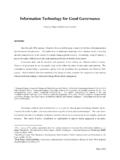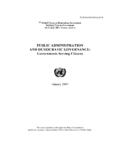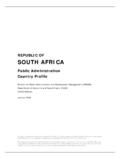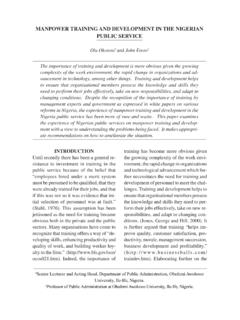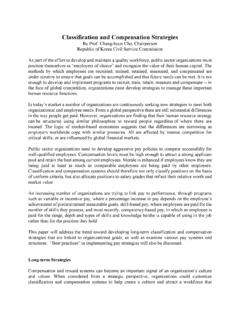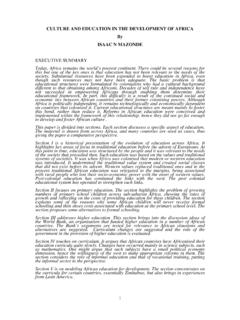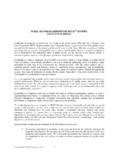Transcription of Principles for Policy Brief in the 21 Good …
1 Policy Brief Principles for good governance in the 21st century Policy Brief August 2003. by John Graham Bruce Amos Tim Plumptre For further information, contact John Graham at the Institute On governance . tel.: (1 613) 562 0092 ext. 231. The Institute On governance (IOG) is a non-profit organization founded in 1990. Its mission is to explore, share and promote good governance in Canada and abroad, and to help governments, the voluntary sector, communities and the private sector put it into practice for the well-being of citizens and society. From our perspective, governance comprises the traditions, institutions and processes that determine how power is exercised, how citizens are given a voice, and how decisions are made on issues of public concern. Our current activities fall within the following broad themes: building Policy capacity; Aboriginal governance ; technology and governance ; board governance ; and values, ethics and risk.
2 In pursuing these themes, we work in Canada and internationally. We provide advice to public organizations on governance matters. We bring people together in a variety of settings, events and professional development activities to promote learning and dialogue on governance issues. We undertake Policy -relevant research, and publish results in the form of Policy briefs and research papers. You will find additional information on our themes and current activities on our Our Policy briefs are all available website,atatour website: Sample titles: Our Policy briefs are all available on our website: briefs. Examples: Policy Brief No. 6: "Capacity Building": A New Way of Doing Business for Developing Assistance Organizations, by Mark Schacter (January 2000). Policy Brief No. 8: Getting the Incentives Right: Improving Financial Management of Canada's First Nations, by John Graham (May 2000). Policy Brief No.
3 12: Rethinking Self-Government Agreements: The Case of Potable Water, by John Graham (November 2001). Policy Brief No. 13: Reinvigorating Democracy: Dealing with September 11th through Modern Town Hall Meetings, by John Graham (September 2002). Policy Brief No. 14: Safe Water for First Nations: Charting a Course for Reform, by John Graham (January 2003). Principles for good governance in the 21st century 1. Policy Brief No. 15 - Institute On governance , Ottawa, Canada Introduction What is governance ? governance has become a hot topic as evidence Definitions can be challenging, subtle, complex and mounts on the critical role it plays in determining powerful. Let us begin by a definition of what societal well-being. The Secretary General of the governance is not. United Nations, Kofi Annan, reflects a growing consensus when he states that good governance is governance is not synonymous with government.
4 Perhaps the single most important factor in This confusion of terms can have unfortunate eradicating poverty and promoting development 1. consequences. A public Policy issue where the Not surprisingly, governance as a term has heart of the matter is a problem of " governance . progressed from obscurity to widespread usage, becomes defined implicitly as a problem of particularly in the last decade government , with the corollary that the onus for fixing it necessarily rests with government. This Policy Brief is the offspring of a major paper on governance Principles for Protected Areas in the Since governance is not about government, what is 21st century presented in 2003 at the Fifth World it about? Partly it is about how governments and Parks Congress in South Africa2. Parks Canada other social organizations interact, how they relate commissioned this paper as part of its lead role in to citizens, and how decisions are taken in a organizing a governance workshop stream focusing complex world.
5 Thus governance is a process on traditional and non-traditional approaches to whereby societies or organizations make their governance of Protected Areas (PA) and systems. important decisions, determine whom they involve in the process and how they render account. Since a This Brief will explore the concept of governance process is hard to observe, and attempt to answer some fundamental questions: students of governance tend to focus our attention on the governance system or framework upon which What are the characteristics of good the process rests - that is, the agreements, governance ? procedures, conventions or policies that define who Are there universal Principles of good gets power, how decisions are taken and how governance ? If so, what are they? accountability is rendered. Where do these Principles come from? In applying such Principles what quality of governance : Who are the players?
6 Who has detail do we need? influence? Who decides? What particular criteria are necessary to build governance ? The concept of governance may be usefully applied How might we apply these Principles to assess in different contexts global, national, institutional current governance regimes? and community. Understanding governance at the national level is made easier if one considers the different kinds of entities that occupy the social and 1. Kofi Annan, Similar themes are economic landscape. found in the New Partnership for Africa's Development (NEPAD) , the UN Millennium Declaration and many of the declarations and plans resulting from the World tra d itio n s Summit on Sustainable Development (WSSD). And the c iv il Harvard Project on American Indian Economic g o v e rn m e n t s o c ie ty h is to r y Development, after almost a decade of research, has m e d ia concluded that economic development on Indian te c h n o lo g y p riv a te s e c to r reservations in the United States is first and foremost a political problem.
7 C u ltu re 2. See governance Principles for Protected Areas in the 21st century prepared for the Fifth World Parks Figure 1. Congress by John Graham, Bruce Amos and Tim Plumptre in collaboration with Parks Canada and the Canadian International Development Agency, 2 Principles for good governance in the 21st century Policy Brief No. 15: Institute On governance , Ottawa, Canada which politicians or public servants share power Figure 1 illustrates four sectors of society, situated with other sectors of society. The theme of the among citizens at large: business, the institutions of 2003 World Parks Congress, "Benefits Beyond civil society (including the voluntary or not-for- Borders" reflected this trend. The prevalence of profit sector), government and the such new institutional arrangements, however, is raising questions about who should properly be Their size as illustrated here may provide a crude involved in what: a classic example of a governance indication of their relative power in many western question.
8 Countries. They overlap because the borders of these organizations are permeable. A similar The zones of governance : who decides and in illustration for other countries could show a very what capacity? different distribution of power. For example, the In principle, the concept of governance may be military or a political party (see figure 2) might applied to any form of collective action. occupy the largest part of the terrain. governance is about the more strategic aspects of Government's role might be quite insignificant. In steering: the larger decisions about direction and some settings, multinational corporations might roles. That is, governance is not only about where play a dominant role. In most countries power is to go, but also about who should be involved in shifting across borders. The size of the private deciding, and in what capacity. There are four sector seems to be expanding.
9 Some state functions areas or zones where the concept is particularly are being transferred to business. relevant. governance in global space', or global governance , deals with issues outside the traditions purview of individual governments4. gov't military history governance in national space', within a civil country: this is sometimes understood as the society technology private sector exclusive preserve of government, of which culture there may be several levels: national, provincial or state, indigenous, urban or local. However, governance is concerned with how other actors, Figure 2 such as civil society organizations, may play a role in taking decisions on matters of public Shifts are also under way in the sphere of civil concern society although the pattern is less clear. In some Organizational governance ( governance in jurisdictions, governments have spoken of the need organization space'): this comprises the to transfer functions to the voluntary sector, activities of organizations that are usually expecting it to take up the slack' as government accountable to a board of directors.
10 Some will withdraws from funding (as is the case of home be privately owned and operated, business care as an alternative to hospitalization). corporations. Others may be publicly owned, In addition, some governments are experimenting hospitals, schools, government today with many partnership arrangements within corporations, etc. 3 Community governance ( governance in There are some complexities in defining these sectors, community space'): this includes activities at but they need not concern us here. For example, does government include state-owned corporations? What 4. about partially owned corporations? Are teachers or good governance is becoming an increasingly schools part of government? And civil society important issue with respect to Protected Areas in part organizations: do they include organizations such as because of the growing number of international lobby groups whose goals are clearly commercial?
